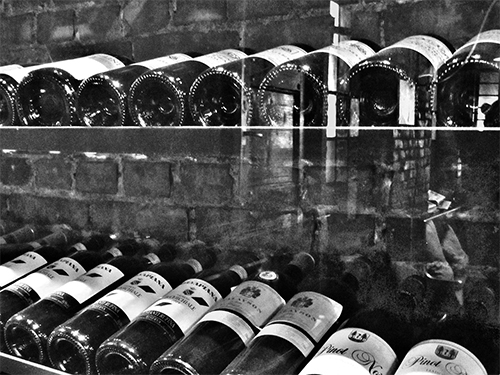Rédigé le 08/07/2020
Pour que votre vin conserve toutes ses qualités jusqu’à dégustation, il est important de penser à son transport et à sa conservation.

Vous êtes sur le point de vous procurer une bouteille, ou une caisse de vin. Vous vous êtes fait plaisir. Pour ne pas gâcher ce plaisir et que ce vin garde toutes ses qualités jusqu’à dégustation, il est important de penser à son transport et à sa conservation.
Considérez le vin comme vivant, et supportant mal les contrariétés. Si vous prenez suffisamment soin de lui, il vous le rendra bien !
Le transport
Une fois sorti de sa tranquille cave où il est né, où il a commencé à murir, le vin doit subir le moins de stress possible. À commencer par le transport. Il préfèrera toujours de voyager à la verticale, bouchon vers le haut, pour être remué le moins possible.
Il faut déjà faire attention à la température. Un trajet, même de quelques minutes, sur une plage arrière ou un coffre de voiture peut altérer son goût à jamais. Il faut, autant que possible, le faire voyager au frais.
Une fois le périple passé, laissez le se remettre de ses émotions, et attendez au moins 3 semaines avant de le déguster…
La conservation
Vous vous en doutez, les conditions idéales de conservation du vin sont celles de la cave de son domaine natal. Il y a été peu bringuebalé, il aura dormi au frais dans une cave enterrée et sombre.
Mais bien sûr, nous n’avons pas tous la chance d’avoir une cave à la maison. Voici quelques conseils pour se rapprocher au mieux de son environnement favori…
Pour commencer, la bouteille doit toujours être couchée, cela permet au bouchon d’être en contact avec le liquide et de ne pas sécher (ce qui à la longue ferait entrer trop d’air dans la bouteille).
Une fois couchée, pensez à disposer la bouteille étiquette tournée vers le ciel et le cul tourné vers vous. Ainsi, vous la dérangerez peu, avec un geste délicat et rapide, pour l’identifier quand vous hésiterez entre plusieurs nectars.
La température rêvée pour la maturation sereine du vin se situe entre 12 et 14 degrés. Plus chaud, il vieillira prématurément, plus froid, trop lentement. Dans les deux cas certains arômes risquent d’être cassés.
L’humidité doit être d’environ 75%. Si l’atmosphère est trop sèche, le bouchon s’effritera, si elle est trop humide, il risque de moisir et d’exposer votre précieux breuvage aux bactéries qui le gâcheront.
Enfin la lumière doit être tamisée et douce. Le vin supporte peu les fortes lumières (c’est d’ailleurs pour cela que la grande majorité des bouteilles sont en verre sombre). Ne dérangez pas le vin avec un néon ou une ampoule plus puissante que 40 watts.
Maintenant que vous savez comment prendre soin de votre vin et respecter sa fragilité, vous pouvez en apprécier toutes les saveurs promises !












